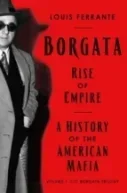Rise of an Empire: A History of the American Mafia (Borgata Trilogy)
 Author: Louis Ferrante
Author: Louis Ferrante
Publisher: Pegasus Books, 2024. 400 pages.
Reviewer: Frederick Martens | April 2024
Historians have spent their careers researching and writing about the mafia, its origins, structure, and cultural implications. Thus, when I initially read Borgata, I was struck by the extent to which Louis Ferrante, who had spent nine years in prison, delved into the most arcane literature on its origins.
Whether this “self-taught international best-selling author who has been accused in open court of numerous acts of violence…,” accurately captures this earlier research will be the topic of lively discourse among criminologists, historians, and organized crime aficionados (p. 31). His 550,000-word trilogy does and will provide a compelling narrative explaining the socio-economic conditions that spawned the mafia. It will not and cannot be ignored.
Indeed, Ferrante encapsulates the anti-immigrant atmosphere that the Italians confronted when they arrived in America, legally and illegally. “Their new world was a savage jungle where they were taken advantage of and referred to” in racist cliches and denigrating terms I chose not to repeat here (p.58).
In the South, the Italians “were hired on old farms once fueled by slave labor, and were prohibited along with African-Americans from occupying public spaces like beaches…The country needed cheap labor, but other than that, we were not welcomed (p. 58-59).
The police, corrupt and racist, left these newly arrived immigrants to fend for themselves in disease-infested ghettos. The politicians in New Orleans passed an ordinance banning Italians from owning businesses on the waterfront (p.86). The United States government petitioned the Italian government to step up its efforts to “stop the flow of criminals into the United States” (p. 100).
While Ferrante set out to write about the mafia, he has also provided a brutally powerful snapshot of immigration policies and how little has changed. The racist epitaphs of the early 20th century are the “dog whistles” of the 21st century.
Inadvertently, perhaps, this initial volume of Ferrante’s trilogy is a tutorial in ethnic studies. He certainly gives us a harsh frame of reference on the current immigration debate. But don’t be misled. History does repeat itself, and Ferrante proves it.
Frederick T. Martens is the former President of the International Association for the Study of Organized Crime (IASOC) and a member of the Global Initiative Against Transnational Organized Crime.


